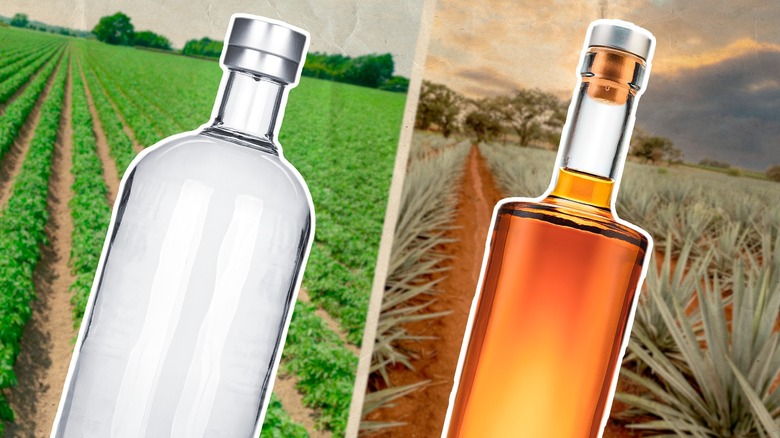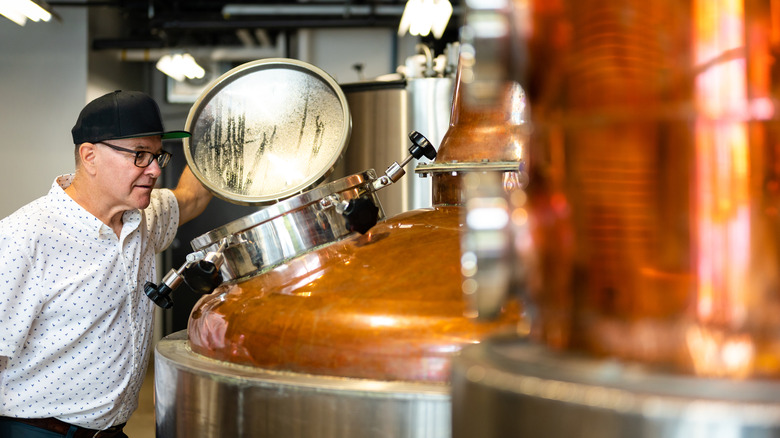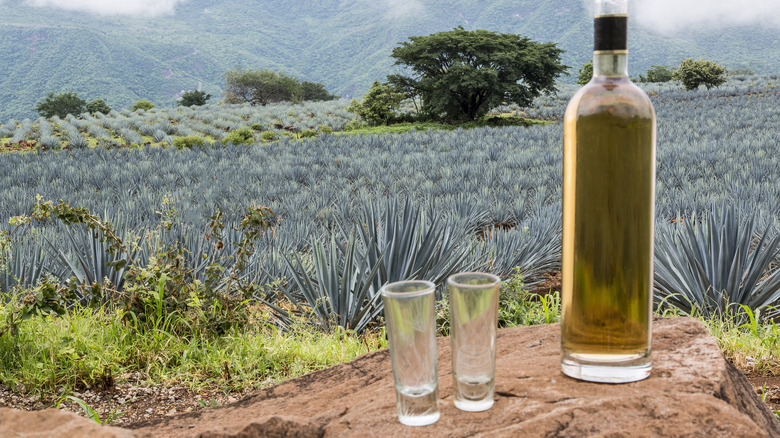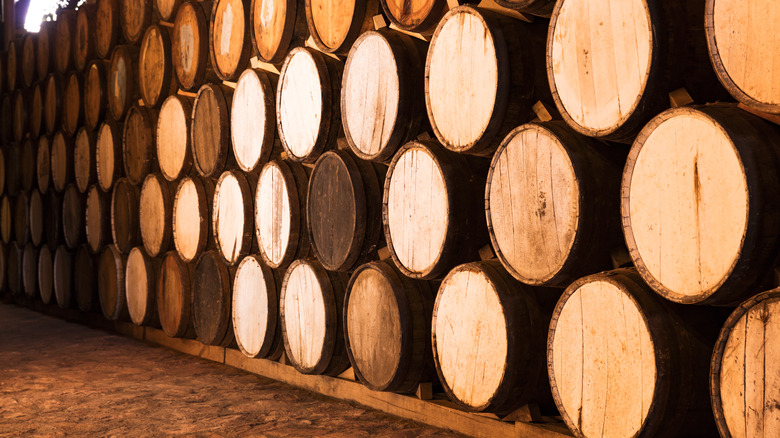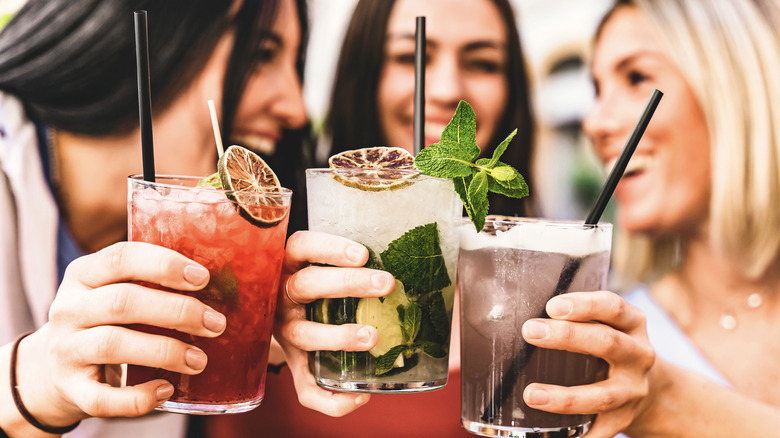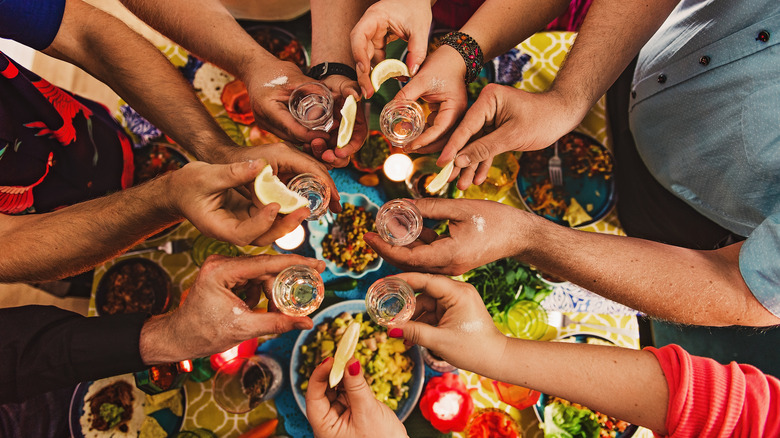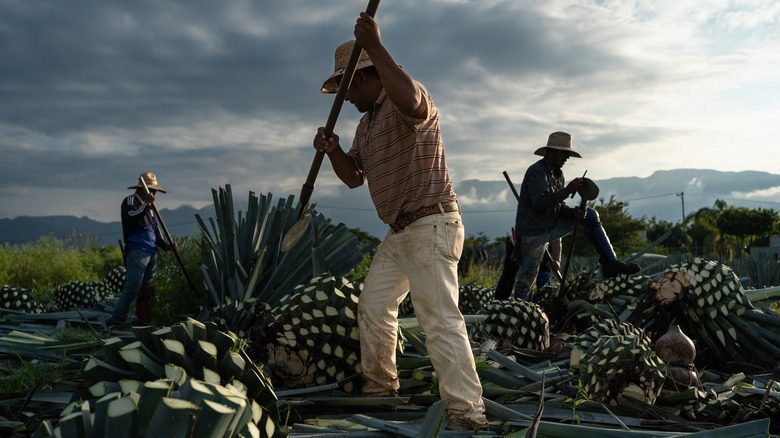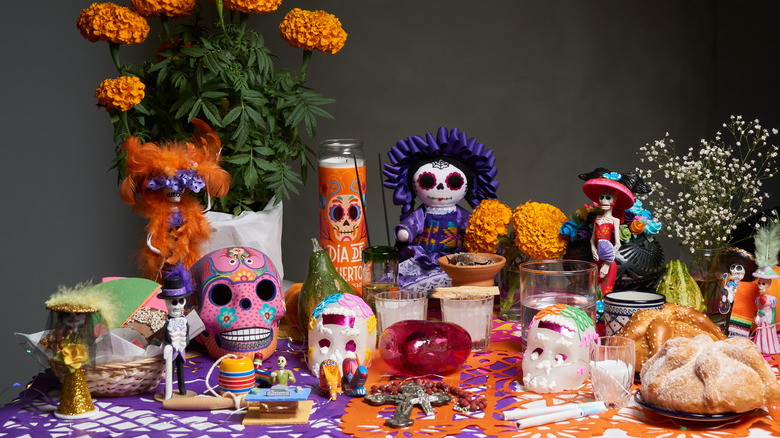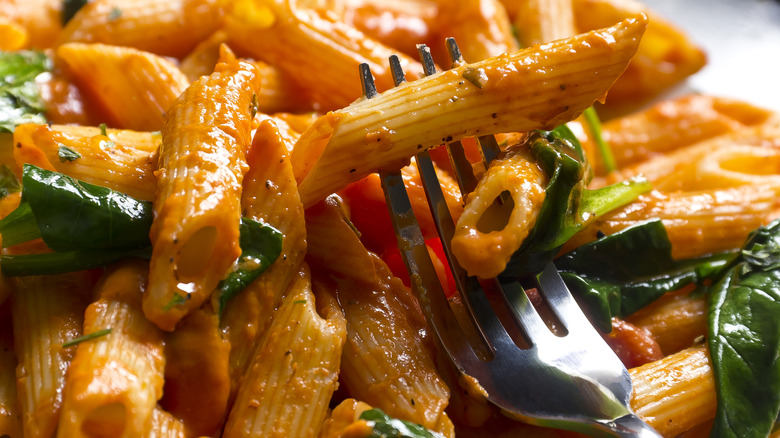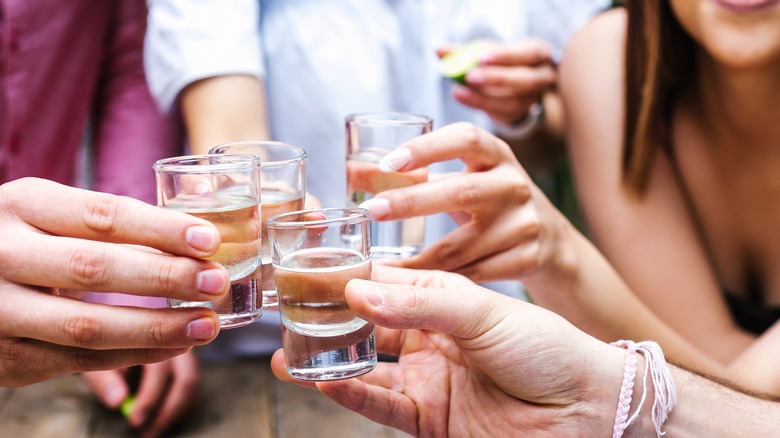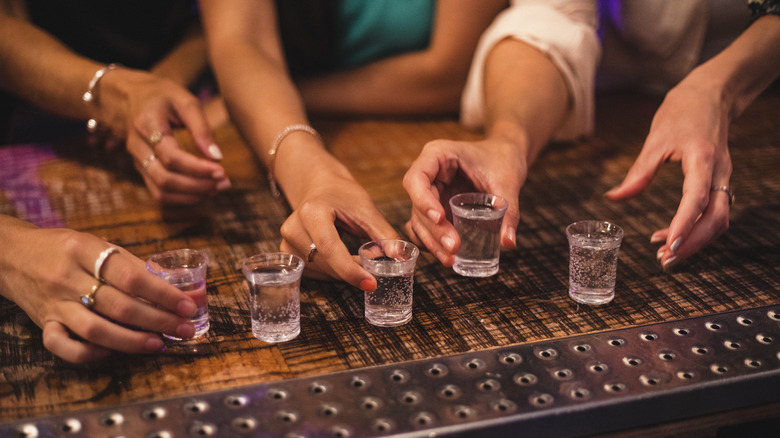The Differences Between Vodka And Tequila
Well over half of all adult Americans drink alcohol, which makes it a major industry in the country, as well as throughout other parts of the world. Vodka and tequila are popular options for these drinkers and, as clear beverages, can seem like they'd be similar choices. This couldn't be further from the truth, though, as the two spirits have more differences than they have similarities.
Despite their similar appearance, vodka and tequila differ in smell, taste, production, and cultural relevance. The two liquors come from different roots, even down to their names. Vodka is Russia's national alcoholic drink, and its name comes from the Russian word "voda," which means water. Tequila hails from Mexico and is also their national spirit. It is less straightforward and more spiritual with its name's origin, though, coming from the Nahuatl word "tequitl," meaning "the place of tribute."
You likely have encountered both vodka and tequila during your everyday life. These cultural liquors have long had a heavy presence outside of their homelands and in bars all across America. You may not see a difference beyond their label on the shelf, but knowing these clear differences could help you identify them when you undoubtedly cross their paths again.
How is vodka made?
Vodka is a versatile liquor that can be made from a variety of natural, edible resources. While it's typically a product of grains like rye, wheat, corn, and sorghum, the spirit must be made from a sugar-rich starch. Potatoes, for example, are a common base ingredient, and sugar beets can even be used as a starter.
This base ingredient is the defining feature of a vodka, but the main ingredient is actually water. Water and the starch are combined with yeast to create a mixture that is fermented for a week or two. This fermentation process creates ethanol, which is then strained from the rest of the fermented material. The ethanol is then heated to high temperatures and vaporized in a process called distillation, which can be repeated any amount of times a maker deems appropriate. The resulting vapor is a purer form of ethanol.
Distillation isn't the endgame, though, as the ethanol then needs to be sorted due to the first products of the process containing toxic, non consumable compounds. These substances, methane and acetone, need to be removed before filtration or dilution can begin. Not all vodkas go through carbon or charcoal filtration, but those that do tend to feel cleaner when drinking. Dilution is the final step, where water is added to meet the desired proof percentage. Vodka makers develop their own special techniques within this complete process to create a variant wholly unique to them.
How is tequila made?
Unlike vodka, tequila is only ever made from one type of starter substance. Weber blue agave, a fructose-packed desert plant originally found in Mexico, is the base ingredient for tequila. The first step in how tequila is made involves harvesting the piña bulb from these agave plants with a special round blade called a coa.
Once the harvesting step is completed, makers then bake the piña bulbs in a horno, an outdoor clay oven. Larger, more modern ovens can be used when creating tequila in larger batches. Baking can take anywhere from 24 to 48 hours, and then sugar extraction can begin. The extraction sees the baked plant shredded and the juice collected. Yeast is then added to the juice and fermented for up to 12 days. This process breaks down the sugars and carbs to create alcohol.
Distillation and aging finish out this long and somewhat complex process. To be considered tequila, the results of fermentation must then be distilled two times, and sometimes an optional third. This process has a double purpose, as it purifies the spirit and determines its alcoholic content. Copper is ideally used for distillation, as it absorbs impurities and acts as a kind of filter to create a cleaner tequila. Finally, cask aging is the last step in creating a unique and powerful tequila. This step is vital, but can range in both time and technique.
Tequila is aged, whereas vodka is not
There are some similar steps in the creation process when comparing vodka and tequila, but tequila does have one major extra step that vodka typically does not undergo. Many tequilas are aged in wooden casks. Vodka doesn't need to be aged, and honestly, it probably shouldn't be. Most vodka drinkers value the liquor for its purity, and aging the spirit would fundamentally change it by adding flavor.
When it comes to tequila, though, the aging process adds significance. There are five types of tequila: Gold tequila is the lowest tier and can be a mixture of aged and unaged tequila. This is typically the most affordable tequila but can derive its color from additives. Blanco tequila can be aged for up to two months but is often bottled right after distillation. When it is rested, it's rarely done in a cask and instead remains in the still. Closest to vodka, tequila blanco is often called the "essence" of tequila; it holds pure agave flavors. Reposado tequila is aged for at least two months and up to one year, añejo tequila is aged for one to three years in an oak barrel.
The most revered — and highest-shelf — tequila is extra añejo, which can remain in its oak barrel for over a decade but must be older than three years. This rare tequila is typically created in small batches for special occasions, and because of this, it comes with a high price tag.
Vodka and tequila have different taste profiles
One of the most noticeable differences between vodka and tequila is how they taste and smell, and the two senses are connected in terms of perceiving flavor. Both liquors can savored, sipped, shot for quick consumption, or mixed to either mask or compliment their tastes. Even those who enjoy cocktails will notice a stark difference between vodka and tequila when the spirits hit their tongue, though.
Tequila tends to have an earthier, vegetal, complex taste that is dependent on how long —or whether — it has been aged. The tequila will take on heavier flavors the longer it is aged in an oak cask. Blanco tequila is better for consuming in shots or cocktails, as its taste is cleaner, lighter, and more floral than aged tequila. When it comes to añejo or even reposado tequilas, the taste and special notes of natural flavors are exploratory and tell the story of the cask; vanilla, dried fruit, or honey are common.
Vodka, on the other hand, is famed for having no smell or taste. This is one of the biggest myths surrounding vodka, as is evident from a tear-inducing sniff test. What is common for vodka is a lack of distinct flavor, though, because the goal of most makers is to get the liquor as pure as possible. Instead, the textural mouthfeel is a focus, even if some distillers do take care to infuse and bring out new flavors.
What flavors to pair with vodka and tequila in cocktails
Vodka and tequila are both the base of some major classic cocktails that most have heard of, but their flavor profiles see them paired quite differently. Tequila's very distinct flavor typically calls for some variation of lime or lemon, whether being shot, sipped, or mixed. Margaritas are hands down the most popular tequila cocktail, typically employing lime with its triple sec base but also branching out with countless other natural flavors like mint, mango, or jalapeño. A salt rim is common with tequila drinks, sometimes infused with herbs and spices for a little extra pizzazz.
Most of what complements tequila will also pair well with vodka, being the more versatile of the two. Citrus flavors like lime and lemon are mainstays in a vodka-based drink, but other citrus and fruity flavors are a good fit as well. Those who want to maintain the crispness of its pure taste will usually pair the liquor with soda water or tonic, along with a citrus wedge. The alcohol is also popular in savory drinks like the bloody mary, a martini, and a white Russian. Vodka's neutral nature makes it the perfect spirit for mixing, which is why it's one of the most popular cocktail bases and liquors in the United States.
What foods pair well with vodka and tequila
When it comes to strong and flavorful drinks like vodka and tequila, pairings go much further than just cocktails. An entire meal can be planned around your choice of alcohol, and both your food and spirit can be enhanced if you choose flavors that complement each other. Considering that vodka and tequila come from different areas of the world and are fully contrasting on the tongue, they naturally match different dishes and ingredients.
Tequila is a natural match for Latin food. Gold or blanco tequila can be mixed into a margarita to drink alongside foods that feature fresh fish, earthy legumes, and chili-laden sauces. Higher-shelf tequila can be sipped alongside hearty, natural flavors like smoked or roasted mushroom, squash, and chicken.
As with cocktails, vodka likes a little more diversity. It can pair with light dishes as well as savory ones, white sauces, along with red. A spritz or spiked lemonade would pair well with lighter fare, while fruit-infused vodka like pomegranate and cranberry could match a beef dish.
Although these liquors can be used to make good cuisine even better, alcohol can be used to upscale fast food as well. You've got an obvious win with tequila and tacos, and vodka can make an unusually great pairing with fries when put in a martini. Investigate a liquor's base flavor in order to create the best matches and open your world to more satisfying meals.
Vodka and tequila have different price points
All alcohols have price ranges, typically categorized by how high they sit on liquor store and bar shelves. This means that most budgets can be satisfied, but quality will steadily drop around the same rate as price. Those on a tighter budget may opt for vodka, though, as tequila tends to be one of the pricier liquor options.
Bottom-shelf tequila can start at just under $10 for a liter, whereas a comparable vodka is sold at a price point of around $6. As for the top shelf, the sky's the limit for each of the liquors; some brands ask hundreds of thousands for luxury spirits. However, tequila typically ends up on top for most everyday brands. This elevated price is due to the extensive time and labor involved in making tequila.
When buying premium or top-shelf vodka, you are typically paying for a smoother experience or a lack of taste and burn. Tequila is pretty much the opposite, as the higher-quality stuff has more complex flavors. Of course, marketing and culture can go into a price tag as well, so it is beneficial to refine your palate before diving into the world of top-shelf liquor.
Vodka and tequila originate from different locales
The history of both vodka and tequila goes deep, but there is very little overlap. The exact origin of vodka is unknown, but heavy associates with East Europe abound across its past and present. Russia is often credited with its origin, as the very first mention of the spirit has been found in Russia from the 9th century. Poland is also associated with the liquor, but early mentions jump to the 14th century in that region. By all accounts, the liquid was not used for consumption until the 15th century, previously being a medicinal substance.
Tequila, on the other hand, is undoubtedly from Mexico. It has always had roots in the agave plant, being used for worship purposes as early as 1000 B.C. It wasn't until the 15th and 16th centuries that the agave mixture was distilled and resembled the tequila we know today.
Now, of course, both vodka and tequila are enjoyed worldwide. Even with this being true, their homelands are still very much attached to them and find a cultural pride in their consumption and creation.
The difference in cultural significance between vodka and tequila
Despite vodka and tequila coming from opposite ends of the Earth, they both play a big part in their respective culture's traditions and ceremonies. Vodka plays an interesting role in Russian weddings, the tradition of guests shouting, "Gorko!" the Russian word for "bitter," as they take a shot. The bride and groom will then kiss, sweetening the bitter taste of the vodka. Funerals also carry a unique vodka-based tradition, where a slice of black bread is placed on top of a glass of vodka. This meager meal is left as a farewell for the deceased.
Tequila is more deeply rooted in Mexican culture, as it is a symbol of the country's past and present. Tequila has both literal and figurative roots in Mexico, the agave plant having been used for cultural practices and the survival of natives for thousands of years. Now tequila is the source of pride and community in Mexico, being consumed in large gatherings and celebrations. During Dia de los Muertos, tequila is left on the altars of ancestors to pay them tribute, so even in death, the liquor plays a vital role.
The difference between cooking with tequila and cooking with vodka
Not only does pairing alcohol with food bring new flavors forward, but actually incorporating vodka or tequila in your cooking could enhance a meal at its core. Cooking with vodka and tequila has a similar logic behind it as pairing the liquors with food. When you want to cook with alcohol that has little influence on the taste of a dish, vodka should be your choice. Tequila, on the other hand, does infuse food with its flavor during the cooking process.
Cooking with vodka adds to the aroma of a dish, which can impact a person's overall perception. The texture is also influenced by vodka, making bread more moist and liquid-heavy dishes smoother. Penne alla vodka is an iconic dish that's made with the spirit, and other sauces can benefit from the straightforward alcohol.
Tequila is used less often in cooking than vodka, mainly because it does add quite a bit to a dish when cooked with. A wide variety of tastes, some fruity, floral, or even herbal, can result in adding tequila to a dish. This wide range makes it important to taste-test your tequila before using it. Seafood dishes, along with marinades, can be enhanced with tequila. It ultimately comes down to personal preference, but these tastes can also result in quite a unique flavor.
Which is better for you nutritionally, vodka or tequila?
The long-term effects of alcohol use are not pretty. Addiction, mental health issues like depression, and physical complications like sorosis of the liver and heart disease are all common ailments. This is just the tip of the sickness-inducing iceberg that is alcohol, but it is possible to choose a "healthier" substance when choosing between spirits. Vodka and tequila are both considered better options if you're imbibing alcohol while still watching your calorie intake.
Both tequila and vodka have a similar calorie count, with one 1½ ounce shot of tequila containing 96 to 103 calories and the vodka counterpart coming in at 96 to 121 calories. Tequila comes out on top here, but both spirits have zero grams of carbs or sugars. It's important to note that these numbers are based on the alcohol themselves, and they would skyrocket if paired with most mixers.
Tequila can be a misleading spirit, and there are actually a lot of myths about tequila that you should probably stop believing. One of these misconceptions is that thanks to the agave it's made from, it has hidden health benefits. While agave does come with digestive and other health benefits, there is currently no sound proof that tequila does. So, while there is a belief that tequila is more beneficial than vodka, take that with a grain — or rim — of salt.
Do vodka and tequila affect you differently?
One major misconception about alcohol is that each one can affect people a certain way. Country songs have been written about tequila's ability to shed clothing and start bar fights, but is that reality or just perception? The truth is, that alcohol is alcohol no matter how it is made or classified, and as long as the alcohol content is the same, it shouldn't affect you any differently.
There has been no scientific study that has discovered varying alcohols affecting different people or personalities with a discernible difference. Actually, tequila isn't even any stronger than vodka or other alcohols, which is another common myth. As long as they are the same proof, two liquors have the same alcohol content.
There may, however, be a couple of key reasons tequila has the reputation of bringing out our inner wildness. It has been speculated that different mixers could affect drinkers, like adding Red Bull or another stimulant to alcohol, which is a depressant. Other sugar heavy mixers could potentially have an effect as well. Also, people who are drinking tequila tend to do so with shots, which can inebriate a person faster than a mixed drink, especially when multiple shots are taken close together.
